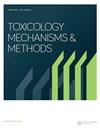Molecular signatures associated with diuron exposure on rat urothelial mitochondria
IF 2.8
4区 医学
Q2 TOXICOLOGY
引用次数: 3
Abstract
Abstract Diuron, 3-(3,4-dichlorophenyl)-1,1-dimethylurea, is a worldwide used herbicide whose biotransformation gives rise to the metabolites, 3-(3,4-dichlorophenyl)-1-methylurea (DCPMU) and 3,4-dichloroaniline (DCA). Previous studies indicate that diuron and/or its metabolites are toxic to the bladder urothelium of the Wistar rats where, under certain conditions of exposure, they may induce successively urothelial cell degeneration, necrosis, hyperplasia and eventually tumors. The hypothesis was raised that the molecular initiating event (MIE) of this Adverse Outcome Pathway is the mitochondrial toxicity of those compounds. Therefore, this study aimed to investigate in vitro the metabolic alterations resulting from urothelial mitochondria isolated from male Wistar rats exposure to diuron, DCPMU and DCA at 10 and 100 µM. A non-targeted metabolomic analysis using mass spectrometry showed discriminative clustering among groups and alterations in the intensity abundance of membrane-associated molecules phosphatidylcholine, phosphatidylinositol and phosphatidylserine, in addition to methylhexanoyl-CoA and, particularly for diuron 100 µM, dehydro-L-gulonate, all of them involved in critical mitochondrial metabolism. Collectively, these data indicate the mitochondrial dysfunction as an MIE that triggers cellular damage and death observed in previous studies.大鼠尿路上皮线粒体暴露与迪乌隆相关的分子特征
摘要:Diuron, 3-(3,4-二氯苯基)-1,1-二甲基脲是一种广泛使用的除草剂,其生物转化产生代谢物3-(3,4-二氯苯基)-1-甲基脲(DCPMU)和3,4-二氯苯胺(DCA)。既往研究表明,迪乌隆和/或其代谢物对Wistar大鼠膀胱尿路上皮具有毒性,在一定的暴露条件下,可先后诱导尿路上皮细胞变性、坏死、增生,最终诱发肿瘤。我们提出的假设是,这个不良结果通路的分子起始事件(MIE)是这些化合物的线粒体毒性。因此,本研究旨在研究雄性Wistar大鼠尿路上皮线粒体在10和100µM浓度下暴露于diuron、DCPMU和DCA对其代谢的影响。使用质谱进行的非靶向代谢组学分析显示,不同组之间存在区别性聚类,膜相关分子磷脂酰胆碱、磷脂酰肌醇和磷脂酰丝氨酸的强度丰度也发生了变化,此外还有甲基己醇辅酶A和脱氢l-谷gulate,特别是对于100µM的二脲,所有这些分子都参与了关键的线粒体代谢。总的来说,这些数据表明,线粒体功能障碍是先前研究中观察到的触发细胞损伤和死亡的MIE。
本文章由计算机程序翻译,如有差异,请以英文原文为准。
求助全文
约1分钟内获得全文
求助全文
来源期刊

Toxicology Mechanisms and Methods
TOXICOLOGY-
自引率
3.10%
发文量
66
期刊介绍:
Toxicology Mechanisms and Methods is a peer-reviewed journal whose aim is twofold. Firstly, the journal contains original research on subjects dealing with the mechanisms by which foreign chemicals cause toxic tissue injury. Chemical substances of interest include industrial compounds, environmental pollutants, hazardous wastes, drugs, pesticides, and chemical warfare agents. The scope of the journal spans from molecular and cellular mechanisms of action to the consideration of mechanistic evidence in establishing regulatory policy.
Secondly, the journal addresses aspects of the development, validation, and application of new and existing laboratory methods, techniques, and equipment. A variety of research methods are discussed, including:
In vivo studies with standard and alternative species
In vitro studies and alternative methodologies
Molecular, biochemical, and cellular techniques
Pharmacokinetics and pharmacodynamics
Mathematical modeling and computer programs
Forensic analyses
Risk assessment
Data collection and analysis.
 求助内容:
求助内容: 应助结果提醒方式:
应助结果提醒方式:


